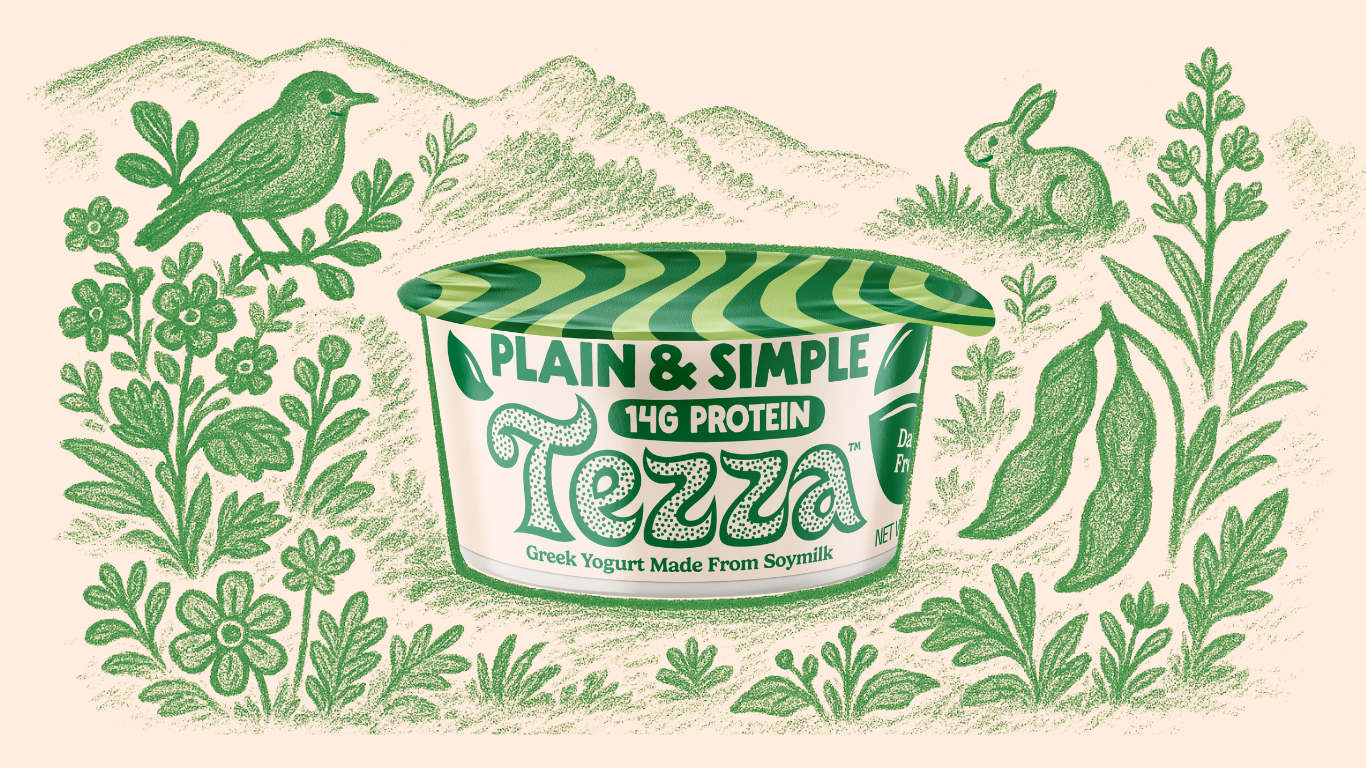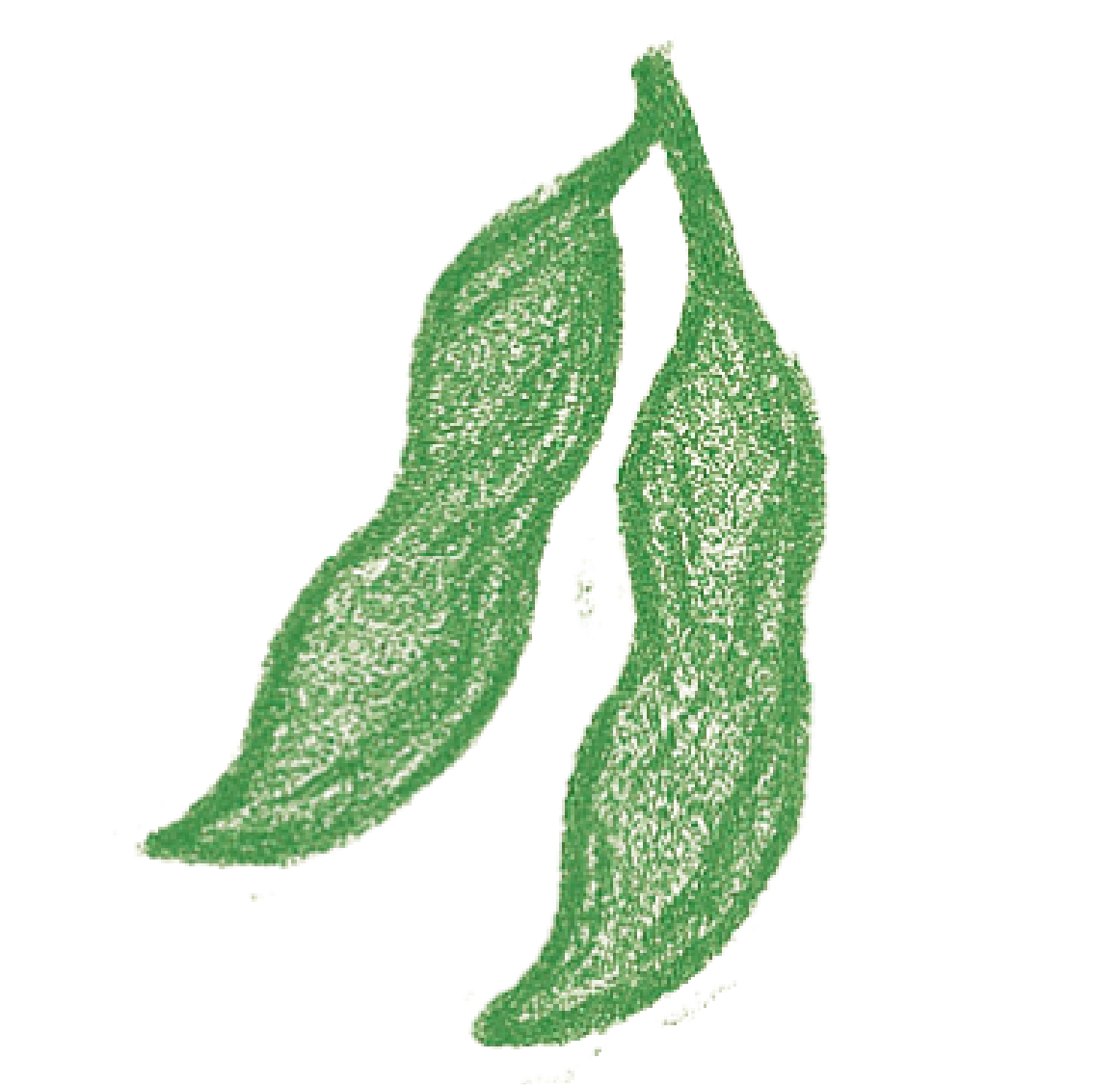Humans turned to soybeans for wholesome nutrition, environmental harmony, and culinary creation for thousands of years, dating back to ancient Asian civilizations.
That's because soybeans have a few magical qualities…
Tezza and the magic beans
Soybeans are the only plants that are high in complete, fully digestible protein.

Soymilk uses ~90% less land, water, emissions, and pollution than dairy milk.
- Cows create a lot of pollution by pooping. Soybeans don't poop.
- Cows drink a lot more water than soybeans do.
- It takes a lot less land to grow and eat plants directly than to grow a lot of plants, feed them to a cow, and get a little bit of meat or dairy.
- Cows generate greenhouse gas emissions in two ways: (1) They burp methane, a greenhouse gas that's 25x more potent than CO₂. (2) Forests are burned or cut down to make room for more grazing and cropland to feed cows, which releases huge amounts of carbon into the air.
- Fun fact: Soybeans actually return nutrients to the soil because they're nitrogen-fixing plants.




Fun fact: Soybeans actually return nutrients to the soil because they’re nitrogen-fixing plants.

Source: J. Poore and T. Nemecek (2018). OurWorldinData.org.

We start with the best beans around:
Non-GMO
organic
grown in america
WHOLE SOYBEANS,
not isolates
We set out to come up with more mouthwatering ways to enjoy the mighty soybean.
So that one day, the world’s most nutritious and sustainable protein is the one we all eat.

You asked, we answered.
-
Check out our store locator here
-
Tezza Greek Yogurts have as much protein as dairy greek yogurt, but with less sugar and more fiber. Click the links below to see the nutrition facts and ingredients for each flavor:
Tezza Plain & Simple Greek Yogurt Product Information here
Tezza Vanilla Greek Yogurt Product Information here
Tezza Strawberry Greek Yogurt Product Information here
Tezza Blueberry Greek Yogurt Product Information here
-
Like dairy greek yogurt, we make Tezza through a traditional natural culturing process that turns milk into thick, creamy yogurt. Only we start with dairy-free milk from whole, organic soybeans—one of earth’s best sources of protein. We never use protein isolates, powders, or oils.
-
Non-GMO: Tezza yogurts are non-GMO project verified.
Organic: Our soybeans are certified organic, while our other ingredients are certified non-GMO but not organic.
Vegan: Our products contain no animal ingredients, and we only source cultures that are grown without animal ingredients. We never have and never will test on animals.
Gluten-Free: We don’t use any gluten in our ingredients, nor does our manufacturing facility process any gluten. However, our products have not been certified gluten-free by a third-party.
-
Humans turned to soybeans for wholesome nutrition for thousands of years, dating back to ancient Asian civilizations. But in the past few decades, we've started to grow soybeans for other purposes, turning this magic bean from the main character to the underdog of our plates. Here, we talk about some of the misconceptions that followed.
Myth #1: Soymilk is less healthy than other plant-based milks.
Once you take out water, soymilk is mostly protein, whereas the other plant milks (oat, almond, coconut) are mostly carbohydrates or fat. And soymilk is the only one with complete protein (meaning it has all 9 essential amino acids) that’s easy to digest (as measured by their perfect PDCAAS score of 1) . Plus it has lots of fiber and micronutrients.Myth #2: Soybeans disrupt hormones.
Humans have been eating soybeans for thousands of years, dating back to ancient Asian civilizations with rich culinary traditions around soy foods like tofu, tempeh, and edamame. And modern science backs up that soybeans are good for us.Soybeans, like many other plants (flaxseeds, lentils, and even the hops used in beer) contain small amounts of phytoestrogens, a plant compound that looks sort of similar to estrogen. However, meta-analyses of thousands of men and women found that daily soy consumption had no hormonal effects and no impact on levels of estrogen and testosterone (Viscardi, G et al., 2025; Reed K. et al., 2021; Hamilton-Reeves JM et al., 2010).
Not only that, but diets rich in soy foods are correlated with lower breast cancer risk, lower rates of heart disease, and lower cholesterol (American Cancer Society, Ma L. et al., 2020). This probably has something to do with the fact that soybeans provide excellent nutrition—they’re high in protein, fiber, and micronutrients, while having very little saturated fat and no cholesterol.
On the other hand, all animal products, especially dairy, contain animal hormones, including estrogen—the exact same type produced in the human body. Many studies have shown that diets high in meat and dairy are correlated with higher estrogen levels and disease risk (Sánchez-Zamorano, L., 2016; Fung, T. et al., 2007; Brinkman, M. T., 2010; Xiao Y. et al. 2019).
Myth #3: Soybeans are genetically modified and have high glyphosate residues.
Not all soybeans—or any food—are made the same way. We only use organic soybeans—that means our soybeans are non-GMO and grown without synthetic fertilizers, pesticides, and herbicides like glyphosate.Myth #4: Soybean farms are bad for the environment.
Soybeans are actually the most sustainable source of plant protein out there. That’s because:
• Soybeans are the only plants high in complete, fully digestible protein
• They use ~90% less land, water, and pollution compared to dairy milk
• They naturally enrich the soil with nitrogen, reducing the need for added fertilizersThe catch? Today, only ~20% of soybeans grown worldwide are eaten by humans. The vast majority is fed to animals. That’s wildly inefficient: instead of eating soybeans directly, we grow huge amounts of soybeans to feed to cows and end up with just a fraction back in meat or milk.
In fact, cows require so much feed and grazing land that beef and dairy production is the #1 driver of deforestation.
The solution is right in front of us: humans should be eating varied, plant-rich diets with lots of whole soy foods because they’re incredibly nutritious, sustainable, and delicious. That is a future that would allow us to meet our nutritional needs, savor in mouthwatering foods, and live in harmony with our environment.
-
Beans, beans, the magical fruit, the more you eat, the more you…
You may have heard about or even experienced this first-hand. That’s because beans have complex sugars that some people struggle to digest.
Lucky for you, we culture our yogurts with billions of live and active cultures. Not only will those cultures help your microbiome flourish, but they also break down those pesky complex sugars into simple sugars for easy digestion.
-
Contact us at hello@tezzafoods.com.











